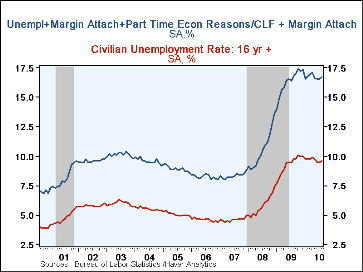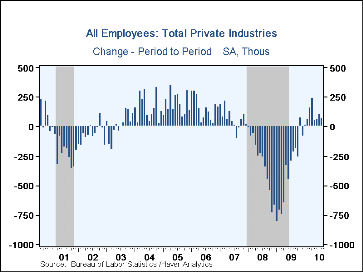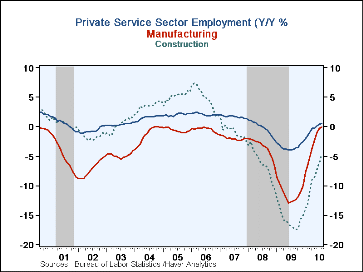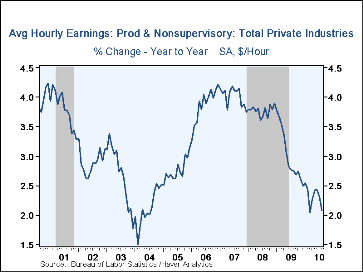 Global| Sep 03 2010
Global| Sep 03 2010U.S. Nonfarm Payrolls Decline As Census-Taking Ends; Private-Sector Hiring Is Again Modest
by:Tom Moeller
|in:Economy in Brief
Summary
The title to this month's write-up is exactly the same as last month since there is little to distinguish the two periods... even the bottom-line interpretation is the same. The job market continued soft, though slightly improved, [...]
The title to this month's write-up is exactly the same as last month since there is little to distinguish the two periods... even the bottom-line interpretation is the same. The job market continued soft, though slightly improved, last month. Nonfarm payrolls declined 54,000 as another 114,000 Census takers were let go. The good news may be that the overall drop in payrolls was half Consensus expectations and followed a lessened 54,000 July decline. Also, in percentage terms the gains were still slight as hiring in the private sector continued modest. A moderate 67,000 increase in private-sector jobs followed an upwardly revised 107,000 July gain, though payrolls did improve 0.3% y/y. So far this year private sector payrolls have risen 0.7% following last year's record 5.2% decline.
Amongst sectors, private service-producing payrolls rose 67,000, 0.7% YTD, and construction jobs increased 19,000 but were down 1.5% YTD. Factory jobs fell another 27,000 though they have risen 1.3% this year after the 11.3% decline in 2009. Amongst industries, 53.0% added to August payrolls and 54.8% increased them during the last three months. Both figures are down from their April peaks. Temporary employment increased 16,800 (22.1% y/y) following the slight July decline.
Overall, individuals worked the same average 34.2 hour workweek as during July. That, however, was up from last year's monthly low of 33.7 hours. The 40.2 hour factory sector workweek was the longest compared to a 33.1 hour week in the private service sector. Aggregate hours worked (employment times hours) so far this quarter are 0.4% above 2Q.
Disappointing payroll employment was accompanied by a rise in the unemployment rate to an expected 9.6% following two months at 9.5%. The rise occurred as 550,000 individuals (-0.2% y/y) entered the labor force following three months of decline. The labor force participation rate rose to 64.7%. That reversed the July decline but it remained near the lowest since 1985. Nearly six million individuals have dropped out of the labor force but want a job now. Household employment rose 290,000 (-0.1% y/y), the first increase in four months. Labor-market underutilization was further evident in the 16.7% of workers who were either unemployed, "marginally" attached or involuntarily employed part-time. Encouraging was the decline in the average duration of unemployment to 33.6 weeks; a lessened 42.0% had been unemployed for 27 weeks or more.
The figures referenced above are available in Haver's USECON database. Additional detail can be found in the LABOR and in the EMPL databases
| Employment: 000s | August | July | June | Y/Y | 2009 | 2008 | 2007 |
|---|---|---|---|---|---|---|---|
| Payroll Employment | -54 | -54 | -175 | -0.0% | -4.3% | -0.6% | 1.1% |
| Previous | -- | -131 | -221 | -- | -- | -- | -- |
| Manufacturing | -27 | 34 | 4 | -0.0% | -11.3% | -3.4% | -2.0% |
| Construction | 19 | -4 | -9 | -4.7 | -15.7% | -6.1% | -0.8% |
| Private Service Producing | 67 | 70 | 60 | 0.6% | -3.4% | -0.2% | 1.7% |
| Government | -121 | -161 | -236 | -0.35 | 0.2% | 1.3% | 1.1% |
| Average Weekly Hours | 34.2 | 34.2 | 34.1 | 33.8(August '09) | 33.1 | 33.6 | 33.8 |
| Average Hourly Earnings | 0.2% | 0.2% | 0.1% | 2.1% | 3.0% | 3.8% | 4.0% |
| Unemployment Rate (%) | 9.6 | 9.5 | 9.5 | 9.7 (August '09) | 9.3 | 5.8 | 4.6 |
Tom Moeller
AuthorMore in Author Profile »Prior to joining Haver Analytics in 2000, Mr. Moeller worked as the Economist at Chancellor Capital Management from 1985 to 1999. There, he developed comprehensive economic forecasts and interpreted economic data for equity and fixed income portfolio managers. Also at Chancellor, Mr. Moeller worked as an equity analyst and was responsible for researching and rating companies in the economically sensitive automobile and housing industries for investment in Chancellor’s equity portfolio. Prior to joining Chancellor, Mr. Moeller was an Economist at Citibank from 1979 to 1984. He also analyzed pricing behavior in the metals industry for the Council on Wage and Price Stability in Washington, D.C. In 1999, Mr. Moeller received the award for most accurate forecast from the Forecasters' Club of New York. From 1990 to 1992 he was President of the New York Association for Business Economists. Mr. Moeller earned an M.B.A. in Finance from Fordham University, where he graduated in 1987. He holds a Bachelor of Arts in Economics from George Washington University.
More Economy in Brief
 Global| Feb 05 2026
Global| Feb 05 2026Charts of the Week: Balanced Policy, Resilient Data and AI Narratives
by:Andrew Cates










